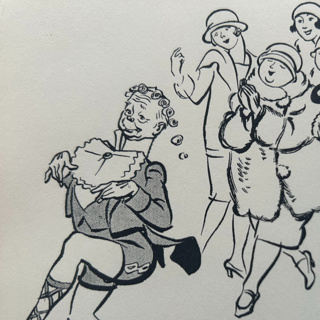
148. Bloody Balfour
This episode looks at the strange behaviour of Captain William O’Shea, the husband of Katharine. She was in one of the great love relationships of their time, with Charles Stewart Parnell. O’Shea wanted to get back into parliament and Parnell, to indulge Katharine, perhaps even to deflect O’Shea’s hostility if not blackmail, went to great lengths to make sure he did. And yet, once he had, O’Shea stood down again within just four months. Next the episode turns to Salisbury, then heading his second government. He decided to fill the recently vacated post of Chief Secretary of Ireland by appointing his nephew Arthur Balfour to it. This is strictly nepotism, since the Latin word nepos means nephew, but to everyone’s surprise, the appointment worked well for Salisbury. Balfour revealed a steeliness no one suspected in him and found the way to impose on Ireland just what Salisbury had called ‘resolute government’. That’s a euphemism for something pretty repressive. At the same time, he set out to address Irish grievances over landholding and over agricultural incomes, pursuing a strategy he called ‘killing Home Rule with kindness’. Together with the repression, that worked, and broke the latest wave of unrest. Still, it’s pretty clear that it wasn’t his kindness that Irishmen focused on most. No, it was the stick, not the carrot, that won him his new nickname: Bloody Balfour. Illustration: Arthur Balfour by Eveleen Myers (née Tennant), circa 1890. National Portrait Gallery P144 Music: Bach Partita #2c by J Bu licensed under an Attribution-NonCommercial-No Derivatives (aka Music Sharing) 3.0 International License.
25 Juni 202314min

147. Salisbury, man of his class
Before we return to the sorry tale of British rule in Ireland, this episode looks at some of the many other issues that Lord Salisbury addressed during his second ministry. What emerges is the portrait of a man of his class, moulded by the outlook of the aristocratic landowner, convinced that his peers were the men best positioned to lead without being ‘defiled by the taint of greed’ and therefore able to ensure that England, and by extension Britain, avoided change that was altogether too radical. That’s too radical not just for him but, indeed, for most Brits. He was a man for whom all change was necessarily change for the worse. And yet, he could read circumstances well enough to know when certain changes were necessary, and ensure, heavy-hearted or not, they were made. One type of change he particularly disliked was modification of principles to suit electoral considerations, but he could make those too. Indeed, that willingness of his contributed to driving forward the process that would make of the Conservative Party the most effective election-winning machine Britain has ever seen. Illustration: Lord Salisbury during his second ministry, Harry Furniss, 1891. National Portrait Gallery 3411 Music: Bach Partita #2c by J Bu licensed under an Attribution-NonCommercial-No Derivatives (aka Music Sharing) 3.0 International License.
18 Juni 202314min

146. Churchill problem, Salisbury solution
It was a bad time for Gladstone, defeated in an election held just a few months after the previous poll which he’d won. It was a bad time for Charles Stewart Parnell and his Irish Parliamentary Party who’d felt Home Rule for Ireland was within their grasp only to see themselves cheated of the prize. But it wasn’t an easy time for Salisbury either who had to approach building his second government with a lot of care, watching out who he offended and who he couldn’t afford to offend. But Salisbury’s biggest problem was the most outspoken and best-known parliamentarian his Conservative Party had in the House of Commons, Lord Randolph Churchill, father of the Winston who would ultimately become far better known than he ever was. Randolph Churchill was a problem for Salisbury until the latter showed his skill by turning the tables on the former. And making it a bad time for Churchill too. Illustration: Photo of the original performance of Shaw’s Arms and the Man, 1894. Music: Bach Partita #2c by J Bu licensed under an Attribution-NonCommercial-No Derivatives (aka Music Sharing) 3.0 International License.
11 Juni 202314min

145. Ireland denied, Conservatism dominant
It was heartbreak time for Parnell. He’d spent eleven years in parliament, leading to the emergence of a powerful Irish Parliamentary Party that eventual won the balance of power. That put Home Rule, the restoration of a Dublin parliament, apparently within his grasp. Yet all that culminated in defeat and disappointment when Gladstone’s bill was thrown out. The loss led to the fall of Gladstone’s third government and the formation of Salisbury’s second. In turn, that was the start of a long period of Conservative dominance over British politics, lasting for nineteen years. Or, in my view, more like 137 years right up to the present day. But to get that well launched, Salisbury had to deal with one great thorn in his side. That was Randolph Churchill. And he sorted that problem with his customary skill. Illustration: Gladstone, Hartington and Chamberlain: political allies but not for much longer. Caricature by Théobald Chartran for 'Vanity Fair', 1880. Public Domain. Music: Bach Partita #2c by J Bu licensed under an Attribution-NonCommercial-No Derivatives (aka Music Sharing) 3.0 International License.
4 Juni 202314min

144. The storm breaks: first squall
The storm that had been building for years over Ireland broke just as soon as Gladstone, with Irish support, finally brought down the Salisbury minority administration. His problem was that quite a few of his own Liberal MPs were unenthusiastic about Irish Home Rule, a policy to which he was now firmly committed, especially as he was dependent on the votes of Irish MPs. Both the Whig tendency within Liberalism, whose leader was Hartington, and quite a few of the Radicals, following Chamberlain, were beginning to separate from Gladstone’s brand of Liberalism. When, therefore, he went into the campaign for his Home Rule Bill, he faced attacks from two wings of his own party, as well as from the Tories, now openly against restoring the Irish parliament since they were no longer hunting for Irish votes. He might have handled some of the opposition more tactfully, especially Chamberlain’s. But it may have been a hopeless task anyway, given the depth of feeling against Home Rule among so many in both parties. Either way, the vote on the measure went just the way one might imagine, as Liberal rebels voting with the Conservatives made sure it was defeated. The first squall of the storm had struck. It had left Gladstone’s attempt at Home Rule in pieces on the floor. And his government was in just as bad a way. Illustration Joe Chamberlain by Harry Furniss. National Portrait Gallery 3349 Music: Bach Partita #2c by J Bu licensed under an Attribution-NonCommercial-No Derivatives (aka Music Sharing) 3.0 International License.
28 Maj 202314min

143. The 86 of 86
Salisbury, who’d secured his position in the Conservative Party by his clever political work over Gladstone’s 1884 Reform Act, was now Prime Minister. But only at the head of a minority government. That wasn’t something he could live with for long, since it meant that the Liberals had a Commons majority hanging over his head, ready to kick him out whenever they decided it was time to use their strength against him. The election, when it came, would have nearly three million more voters on the registers than previous time around. Many of them would be Irish, including quite a few Irishmen living in England. So issues to do with the government of Ireland, and in particular Irish Home Rule, would be a key factor in the outcome. Both main parties had contacts with Parnell and his Irish Parliamentary Party. Gladstone, though he had come around to supporting Home Rule himself, encouraged Parnell’s conversations with the Conservatives, rather hoping to have them introduce Home Rule rather than having to do so himself, if he came back to office heading a new Liberal government. Salisbury was having none of that since he was opposed to the whole idea of Home Rule. On the other hand, with Irish votes at stake, he didn’t mind people thinking he might be considering the possibility. So Parnell spoke to both sides. Then, when the election results were announced, it turned out Gladstone had won but without a majority, with the Conservatives second. Parnell’s Irish party had taken 86 seats, the 86 of 86 as they were called, since the parliament only met in 1886. He held the balance of power. In the meantime, a bold action by Gladstone’s son with the British press, the so-called Hawarden Kite, had seen the Liberal leader identified as the champion of Home Rule. Parnell could put him back into office. Maybe it was time for him to stop flirting with both sides and commit himself to the Liberals who seemed committed to the goal he was pursuing. Or were they? Illustration: Herbert John Gladstone, First Viscount Gladstone, by Sir Leslie Ward, published in Vanity Fair, 6 May 1882. This is Herbert, Gladstone's son and a Liberal MP, who was responsible for flying the 'Hawarden Kite'.National Portrait Gallery 3288 Music: Bach Partita #2c by J Bu licensed under an Attribution-NonCommercial-No Derivatives (aka Music Sharing) 3.0 International License.
21 Maj 202314min

142. The storm clouds gather
After nearly five years in power, the strains inside the second Gladstone government were beginning to show. Indeed, both main parties were having trouble, above all with their respective awkward squads. The Radicals in the Liberal Party were always demanding more and greater reform. Meanwhile, the ‘Fourth Party’ launched inside the Conservatives by Lord Randolph Churchill (father of the more famous Winston) demanded more ‘Tory democracy’, though it’s not clear what that meant, except that it always seemed to lead to the political progress of Churchill himself. With the Reform Act of 1884 as its only major accomplishment, Gladstone’s government staggered on towards its end. Both main parties realised that the Irish MPs would be crucial to the formation of a new government after the next election, the first to be held on the basis of the extended electorate brought in by the Reform Act, and both were therefore courting Parnell. He, indeed, worked with the Tories to bring down Gladstone in a Commons vote on a financial question. Then, with Salisbury leading a minority government to cover the time until the new electoral register was complete and an election could be held, Parnell took part in negotiations with both sides, in the hope of advancing his cause of Irish Home Rule. That led to a lot of secret negotiations hidden behind a veil of universal dishonesty. The consequence was that Home Rule was now firmly back on the political agenda. It would be the great issue of the next couple of years. Which, in turn, would make it the determining factor in convulsions about to rock the British political system. Illustration: Lord Randolph Churchill by Harry Furniss.National Portrait Gallery 3559Music: Bach Partita #2c by J Bu licensed under an Attribution-NonCommercial-No Derivatives (aka Music Sharing) 3.0 International License.
14 Maj 202314min

141. Success at last
As the second Gladstone government approached its end, it had little enough to point to as major successes. Some measures had been passed to try to pacify Ireland, but that sad country was still far from reconciled to British rule. There’d been colonial disasters in South Africa and Sudan. There’d been the Labouchère amendment, not perhaps seen as all that significant at the time, but something that would open the doors for eighty years of shameful treatment of gays, leading to Oscar Wilde’s imprisonment and Alan Turing’s suicide. Then, at last, the government came up with one really major achievement. That was the 1884 Reform Act, which added nearly three million new voters to the electorate. They were all men and still only 60% of them, but it was still a significant advance. Lord Salisbury, who’d got his fingers burned in the painful and ultimately failed campaign to block the Arrears Act for Ireland, this time adopted a cannier approach and worked hard to stiffen up his support. He took the line of refusing to let Reform through the House of Lords, where the Conservatives had a built-in majority, unless it was accompanied by Commons seat redistribution, to mitigate the damaging effect on his party’s electoral chances. This time he was successful, reversing the damage to his standing caused by the earlier failure, and putting him in a strong position to become sole leader of the Conservatives when the existing dual leadership with Stafford Northcote ended. Reform had proved successful for both main party leaders. Illustration: Cover of the Reform Act 1884. © ParliamentaryArchive Music: Bach Partita #2c by J Bu licensed under an Attribution-NonCommercial-No Derivatives (aka Music Sharing) 3.0 International License.
7 Maj 202314min





















